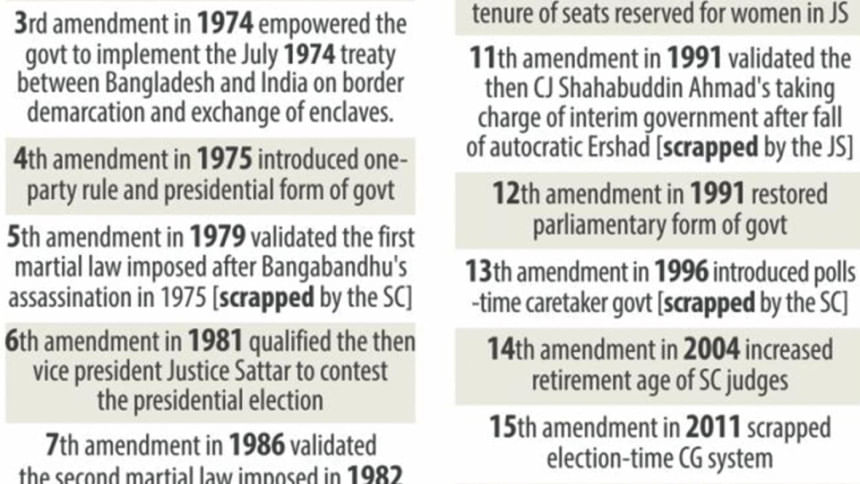Impeachment of judges

The recent verdict of the High Court Division declaring 16th Amendment of the Constitution unconstitutional has created a debate in the country, more particularly among the members of the Parliament. Hearing the verdict the session of the Parliament condemned the verdict and the court as well. By the 16th amendment the parliament took back the power to impeach the judges of the Supreme Court (SC). The original provision of the Constitution was restored by the amendment canceling the 5th amendment. The matter is sub-judice, and hence, this piece will reflect on some issues purely on legal and constitutional endowments.
Very recently, party in power has been trying to establish the theory of 'Sovereignty of Parliamentary' which is indeed a theory, let alone the practice in our country. Our Constitution did not manifest sovereign and supremacy of the parliament, rather it established constitutional supremacy.
The principle of article 7 does not necessarily indicate the concept of parliamentary supremacy. Authority of article 7 will be exercised by parliament in accordance of Constitution. The plain reading of title of article 7 is 'Supremacy of the Constitution' which says, “All powers in the republic belong to be people, and their exercise on behalf of the people shall be effected only under, and by the authority of, this constitution.” Parliament is subject to the constitution. If any law or any provision thereof made by the Parliament are incompatible with the Constitution, would be void.
We have ample references in hand where SC declared amendment or any law void with reference to that particular article. The recent argument among the legislators suggesting that the Court does not have the authority to declare the amendment void is not supported by the Constitution. As a guardian of the Constitution, the SC has full authority to declare any amendment or any law void and not as per the Constitution.
The provision of Supreme Judicial Council (SJC) as it was previously enshrined in our Constitution is not a popular form of impeachment of judges of the SC in ideal democracy. It is one of the major arguments from the Legislative and the Executive side of the State. But, to argument for ideal impeachment procedure without having an ideal democracy is rather a hypothetical mêlée indeed.
We do not nevertheless enjoy an ideal democratic culture as aspired in our original constitution where 'impeachment' was vested in the parliament on the consideration that we have obtained that culture and will continue to practice as well. In addition to this, we have article 70 which was also cited in the observation of the court.
The Constitution has the provision for separation of the judiciary from the executive. Revoking the power from SJC to the parliament is also not compatible with article 22. Beside, the provision of article 116 makes article 22 more effective. The lower judiciary is still not independent as aspired in article 22. To allow the judiciary to grow independently, power to remove and rheostat judges need to be vested in the hands of judiciary.
The irony is that the same parliament and the executive that have condemned the recent decision of the HCD had once applauded the judgment of 5th, 7th and 13th amendment.
The need of the time is to have a clear and transparent appointment procedure for our judges. Without having so, we are vocal about their removal procedure. We should first look in to their transparent appointment procedure. If it is settled, the impeachment and removal procedure will work better preserving the dignity of the judiciary.
Even the present provisions of SJC need to be reconsidered in a practical way.
If impeachment is transferred to the parliament, the Chief Justice must be a part of it and majority of the member should have constitutional oath. And other dysfunction of the amendment will prevail in the non-prevalence of two-third majority of the party in the house. What will happen to the judge eligible to be removed by the parliament having no two-third majority by any party?
The only constructive role was played by the law minister on 5th May. He, in the face of protests from his fellow MPs has tabled the bill on remuneration of the judges.
However, the government will appeal against the judgment before the Appellate Division of the SC. The Hon'ble SC will surely come up with observations. As the matter is sub-judice, we must be cautious before comment on it and wait until final delivery. We must uphold the honor and dignity of the judiciary in all our judicial or political issues of any kind.
The write is lawyer and researcher.

 For all latest news, follow The Daily Star's Google News channel.
For all latest news, follow The Daily Star's Google News channel. 



Comments